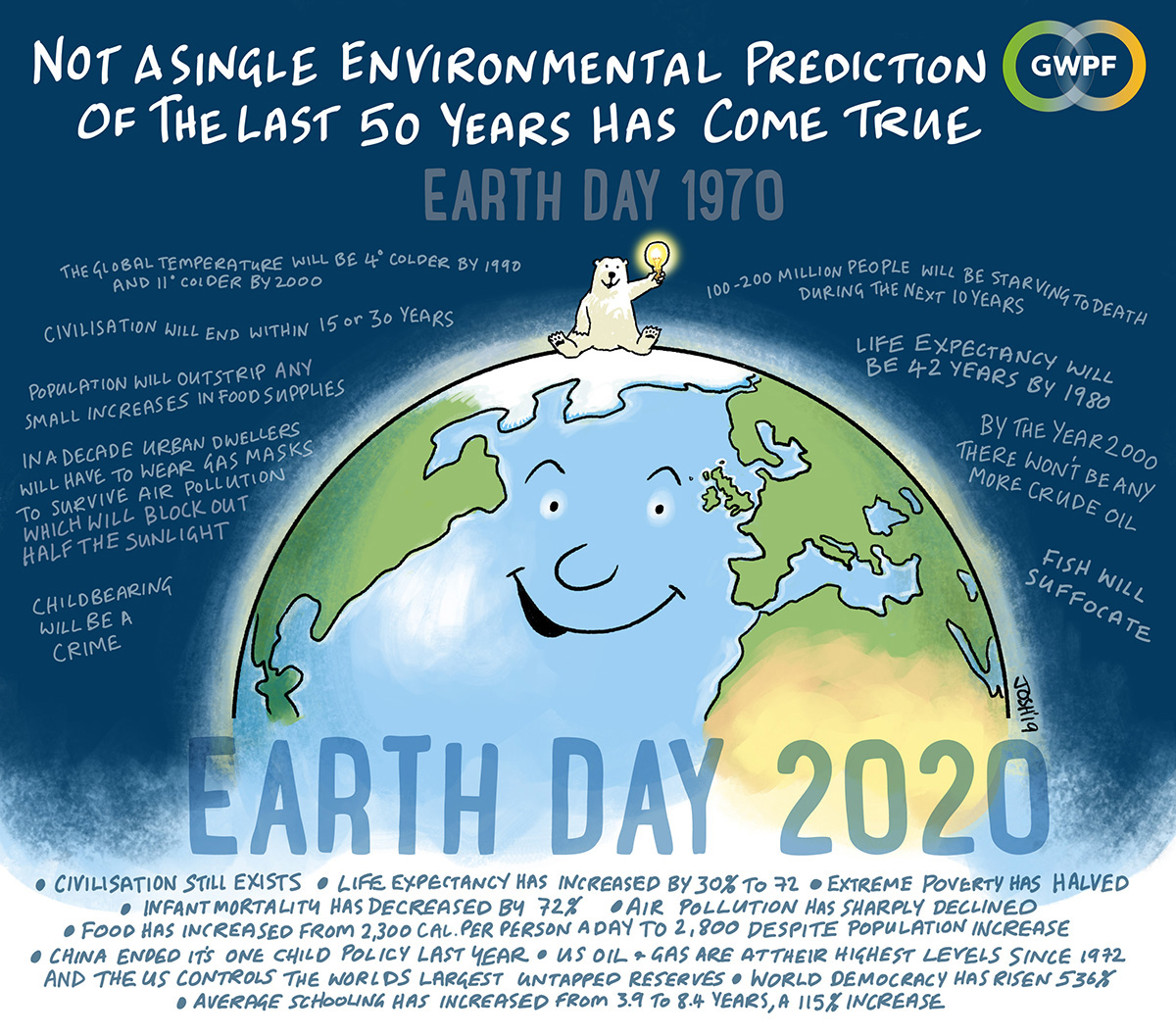Every now and then, I pick up a book which slaps my mindset into a new paradigm. No seed flowers on barren soil, of course, so in it’s true that in some ways I might be mentally primed to receive the message such books impart. Nonetheless, I am lucky to have, over the course of my life, occasionally picked up a book which gives me a mental clip over the ear.
One such book was Bjørn Lomborg’s The Skeptical Environmentalist. Having grown up in a pre-‘green’ environmentally-conscious household, having long become disenchanted with green-left politics, the book immediately caught my eye. Its step-by-step dismantling of nearly every dogma of environmentalism was a hurricane-blast of fresh air. Despite desperate attempts to ‘debunk’ it by attacking the occasional pettifogging detail, its overall thesis has resisted the fierce backlash it earned.
On the 50th anniversary of Earth Day, Lomborg reminds us that it is worth looking back at the dire predictions mainstream environmentalists were trumpeting, back in 1970. Chief organiser for Earth Day, Denis Hayes, agreed with serial Jeremiah Paul Ehrlich’s dire claim that hundreds of millions would inevitably starve, even in the US, by 1980. “It is already too late to avoid mass starvation,” he said.
Other environmental luminaries competed to outdo each other with their apocalyptic claims. Populations only surviving with gas masks, oil depleted and global temperatures plummeting 11° by 2000, no arable land – you name it, they predicted it.
None of it came true.
Many people are surprised to hear that the environment is improving, a lot. This surprise grows from the unfortunate flip side of the Earth Day legacy, which too often can focus on doom and alarmism that can make us despondent and drive poor policies.
Early environmentalism from the 1970s helped focus societies on important environmental priorities such as polluted rivers[…]Most bodies of water in rich countries are much cleaner, since we are prosperous enough to clean up our mess[…]And 3.8 billion people in the world have gained access to clean drinking water over multiple decades in that time.
Air pollution, the biggest environmental killer, has seen even greater improvements.
So, on Earth Day 2020, we should all have clinked our glasses and celebrated the vastly improved environment we live in. We should also be having a collective chuckle at the apocalyptic nuttiness of the 1970s environmental movement.
But, curiously, this is not our typical environmental conversation. We don’t emphasise enormous improvements or focus on vital unfinished business in water and air. Instead, the standard story is how the environment is getting ever worse — how we’re hurtling towards catastrophe. This tradition also started with Earth Day.
Not only were these predictions spectacularly wrong but they were outlandish when first made. Yet, in a world where more alarm gets more attention, they started a trend of framing environmental issues in worst-case ways. This tone scares, this depresses — and this likely skews our focus and spending.
This should have been the focus of Earth Day 2020: the frightful cost of the perpetual wrongness of the green left.
Not only have these loons been defiantly at odds with evidence and logic at every turn for the last half-century, they’re almost singlehandedly responsible for a wicked waste of valuable resources. Time and money that could have all-but-erased crippling problems in the developing world, like poor water quality and endemic disease, have instead been steadily wasted on the idiotic conceits of the wealthy, Western green-left.
Today, climate change takes up most of the environmental conversation, and it is definitely a real problem. However, too often it also is framed in exaggerated fashion, with predictable results: a new survey shows that almost half of humanity believe global warming likely will make humans extinct.
This is entirely unwarranted. The UN Intergovernmental Panel on Climate Change, the gold standard of climate research, finds that the overall impact of global warming by the 2070s will be equivalent to a 0.2 per cent to 2 per cent loss in average income. That is a problem but not the end of the world[…]
Climate change mitigation today costs more than $US400bn ($634.5bn) each year in renewable subsidies and other costly climate policies. Yet we spend much less on making water and air cleaner for the billions with basic needs.
Climate change – like environmentalism generally – is not just the ultimate First World Problem, it’s a disgusting display of green-left vanity. Environmentalism is a middle-class Western Extinction Rebellion protester playing dress-ups and doing an interpretive dance on a pile of Third World corpses.
If you enjoyed this BFD article please consider sharing it with your friends.

